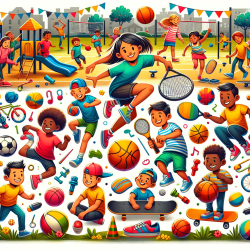Introduction
Physical education (PE) is a cornerstone of childhood development, offering a multitude of psychological, social, and physical benefits. However, research indicates a decline in physical activity participation as children transition to adolescence, with girls experiencing a more significant drop. A study titled "Gender, perceived competence and the enjoyment of physical education in children: a longitudinal examination" provides insights into this phenomenon, highlighting the critical role of perceived competence in shaping children's enjoyment of PE.
Key Findings
The study, conducted by Cairney et al. (2012), followed a cohort of children from grade four to six, assessing their enjoyment of PE and perceived athletic competence over time. The results revealed several important trends:
- Enjoyment of PE declined among girls but remained constant among boys.
- Higher levels of perceived competence were associated with greater enjoyment of PE.
- Girls with low perceived athletic competence showed the most significant decline in PE enjoyment over time.
- Boys with low perceived competence maintained a consistently low level of enjoyment.
Implications for Practitioners
These findings suggest that interventions targeting perceived competence could enhance PE enjoyment, particularly for girls. Here are some strategies practitioners can consider:
- Foster a Positive Environment: Create a supportive and inclusive atmosphere where all children feel encouraged to participate, regardless of their skill level.
- Focus on Skill Development: Implement programs that emphasize skill-building and personal growth rather than competition, helping children develop confidence in their abilities.
- Offer Diverse Activities: Introduce a variety of physical activities to cater to different interests and abilities, allowing children to discover what they enjoy most.
- Encourage Autonomy: Provide opportunities for children to make choices about the activities they engage in, fostering a sense of ownership and motivation.
Encouraging Further Research
While the study sheds light on the relationship between perceived competence and PE enjoyment, further research is needed to explore additional factors influencing children's experiences. Practitioners are encouraged to delve deeper into the following areas:
- Investigate the impact of teacher competence and classroom environment on children's enjoyment of PE.
- Explore the role of parental involvement and support in shaping children's attitudes towards physical activity.
- Examine the long-term effects of PE enjoyment on overall physical activity levels and health outcomes.
Conclusion
By understanding the factors that influence children's enjoyment of physical education, practitioners can implement targeted interventions to create more engaging and inclusive programs. Enhancing perceived competence and providing diverse, enjoyable activities can help foster a lifelong love of physical activity, benefiting children's health and well-being.
To read the original research paper, please follow this link: Gender, perceived competence and the enjoyment of physical education in children: a longitudinal examination.










